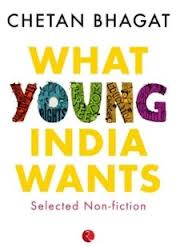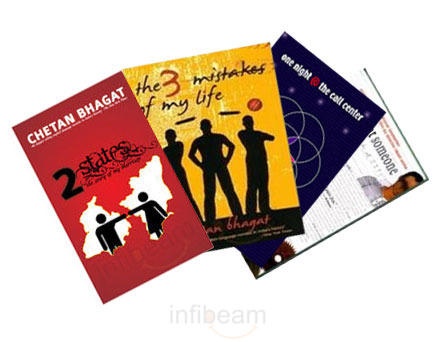
Sure, the man has written novels that have gained mass fan following in the Indian audience and given his work a cult-status of sorts. Some may even be of the opinion that Bhagat helped bring about a change we hadn’t seen until his first book, 5 Point Someone hit the stands: he got a huge number of Indians to read. Traditionally, the Indian way of life doesn’t necessarily encourage reading to be an important hobby or habit. Barring the educated section of the society, reading isn’t an activity that is deemed important and hence it isn’t encouraged and cultivated among children unlike in the West. Thus, when Chetan Bhagat swept in with his charming stories about characters the young Indians identified with, recognized and related to, they read his books. They read his books for the melodrama, the element of gritty reality, the Bollywood inspired love-angle. It’s as simple as that.

Over time, it is the commercialisation of the industry that has taken precedence over quality writing. We found an audience that accepted and relished a badly written novel simply because its story was fresh and then we took advantage of them. Suddenly, it became all about the idea. The writing became secondary. Snazzy cover pages and alluring descriptions became the norm. Everyone wanted to cash in on the segment of readers who craved stories they could relate to and soon we were left with a barrage of Indian authors, but only a few who could weave a story like it’s meant to be.

Today, I am filled with scepticism whenever I stand in the Indian Writing aisle at a bookstore because even though the story may catch my fancy, I shudder to think what the writing will be like. It is an unfortunate reality that although Chetan Bhagat got more Indians to read, the commercialised and profit driven industry that publishing has turned into, gave an impetus to a lot of rubbish that shouldn’t have ever seen the light of day. Instead of nurturing the reading habit of young India, publishers smothered it by feeding them more trash. And those readers who were glad to have a new host of writers to add to their prized bookshelf were left sorely disappointed in due course of time.
Here’s sincerely hoping that the coming few years see publishers printing books that have innovative stories, are flushed with creativity and respect the richness of the English language.
Writer is a student at SIMC.




he writes pulp fiction…hez nt really a writer
agree
I might have liked his first book, but the last one ‘ Revolution 2020’ was a complete mess. I never figured out what made him write it at first place. And after I managed to finish reading it, I was angry. Don’t know why.
A good article, by the way. 🙂
Very true. It has become a nightmare seiving trough quality Indian writers. Out of the blue there are so many on the stands that more often than not I pick up the wrong book. like you rigtly said at times based on ‘snazzy’ covers and ‘craftly’ edited synopsis. Well written article Shirley. Great going.
Awesome writing of chetan bhagat and keep continuing this this.
The last two paragraphs were intense. I particularly adore the fact that Shirley chose to emphasize “the richness of the English language” .